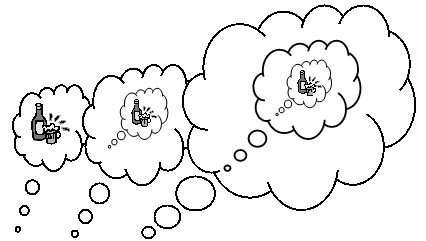Thoughts are not only free but also infinite in number.
This claim sounds audacious; how could something finite, such as a brain, produce or contain an infinite number of thoughts? Well, what is meant is that there is an infinite number of possible thoughts that a person can have — or, to put it another way, an infinite number of things that can be thought. This was proven by the mathematician Richard Dedekind in 1887:
"My world of thoughts, that is, the totality S of all things that can become subject of my thought, is infinite.* Now we can define a mapping function φ over S that maps each element s of S with the thought s' that s is a possible object of my thoughts. Clearly, s' is also an element of S. The totality of images φ(s) forms a subset S' of S. S' is, moreover, a proper subset of S as there are elements in S (such as my own Self) that are distinct from any thought of the type s' and are not, therefore, contained in S'. Finally, it is obvious that if a, b are distinct elements of S their images a', b' must be distinct as well. Hence, our mapping function φ is one-to-one. This shows that S is infinite, which is what we wanted to show."**
This proof relies on the following definition of an infinite set: A set S is infinite if and only if there is a one-to-one projection φ — by which Dedekind means a ►bijection — onto one of its proper subsets. Got it? Let us translate from the precise language of mathematics into our clumsier everyday language. Assume that you are entertaining a particular thought s such as "A beer would be good right now".

Merely by thinking about that thought you have already produced a new thought s', namely, the thought that you are thinking the thought "A beer would be good right now". Thus, you now have two thoughts: the one about the beer and the one about your thought of the beer.

And this leads to yet another thought, for you can have a thought about the second of the two thoughts just mentioned. That is, just as you can think about beer, and think about your thought about beer, you can think about your thought about your thought about beer.
Let's try to make this less abstract by putting some content into all these thoughts about thoughts. We start with the thought,
A beer would be good right now.In philosophical parlance, this is known as a first-order thought, since it is a thought about something that is not, itself, a thought. We'll call it s.
Then — if, say, you were brought up in a religious tradition in which alcohol is forbidden — you might think,
The thought I just had (that a beer would be good) is a temptation to be resisted.This would be known as a second-order thought since it is a thought about a thought. We'll call it s'.
Reflecting further, you might then think,
That second thought (that my thought about beer is a temptation) is a product of my religious upbringing.This is a thought about your thought about your thought about beer — a third-order thought, obviously. We'll call it s''. Your mind is now filled with three thoughts: s, s', and s'' (in addition to all the other thoughts that you might have at the same time — for example, perhaps, "I think too much").
In principle, there is no limit to this process of constructing thoughts about thoughts about ... Note, though, the qualification "in principle"; in actual practice, if you tried to carry it on to infinity, you'd reach a limit somewhere — a limit to your brain's capacity to retain complex thoughts, or to your lifespan, or (most likely) to your patience. Nevertheless, whichever thought constitutes the highest-order one you wind up forming, there is another thought that could be formed about that one, and still another one about that one, and so on, even if you're not able to form them because of your particular limitations.

By thus thinking about your thoughts you can — or could, if you had infinite cognitive capacity, lifespan, and patience — produce*** an infinite sequence of thoughts s, s', s'', s''' .... The set of thoughts that it would be possible to have is therefore infinite. By itself, this looks like a trivial insight of little practical significance. However, by engaging in this little exercise you may actually help fight the evil of alcoholism. For since a human being, according to many psychologists, can think only up to four thoughts at a time, you will have forgotten about your original thought of a beer by the time you have reached s''''.
* To be sure, the number of neurons in the human brain is finite. The number of their possible interconnections — and thus the number of possible human thoughts — amounts to about 1070000000000000. Hence, Dedekind's proof can only apply to the number of possible thoughts as such, not to any set of thoughts all of which some person might actually have.
** Richard Dedekind, Was sind und sollen die Zahlen? ("The Nature and Meaning of Numbers"), Braunschweig 1888
*** Don't overdo it, though. A number of well-known mathematicians who spent too much time thinking about infinity ended up in mental derangement.